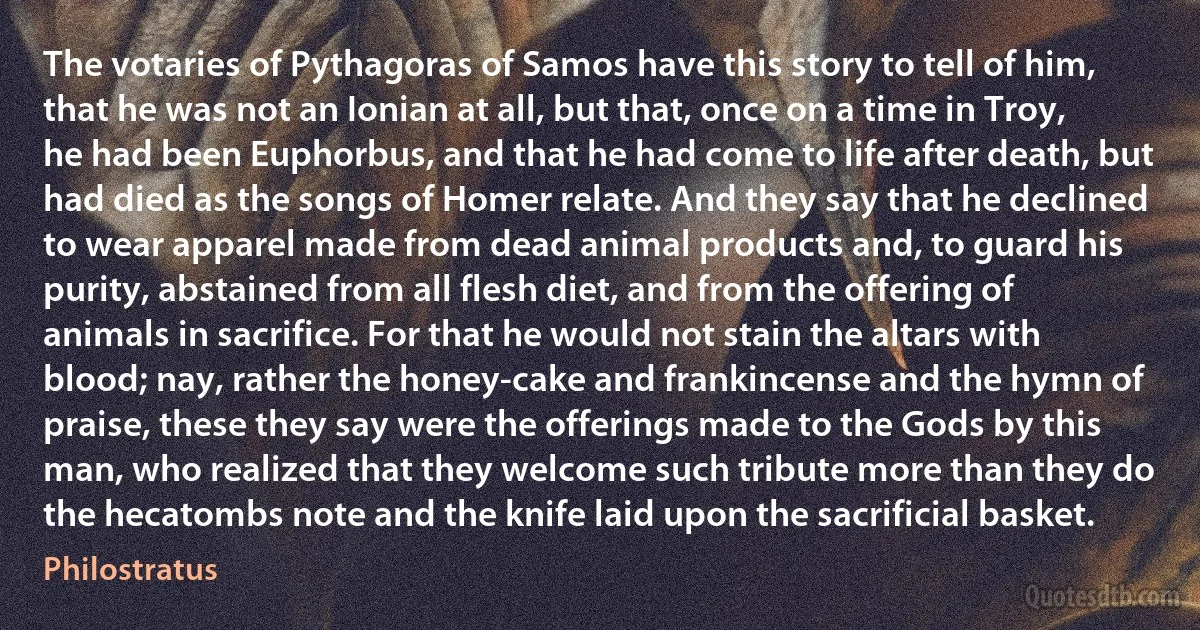
The votaries of Pythagoras of Samos have this story to tell of him, that he was not an Ionian at all, but that, once on a time in Troy, he had been Euphorbus, and that he had come to life after death, but had died as the songs of Homer relate. And they say that he declined to wear apparel made from dead animal products and, to guard his purity, abstained from all flesh diet, and from the offering of animals in sacrifice. For that he would not stain the altars with blood; nay, rather the honey-cake and frankincense and the hymn of praise, these they say were the offerings made to the Gods by this man, who realized that they welcome such tribute more than they do the hecatombs note and the knife laid upon the sacrificial basket.
PhilostratusRelated topics
animal apparel basket blood dead death diet flesh guard hymn knife lay life man note once praise say story tell time wear welcome gods pythagorasRelated quotes
To experience and live out a harmony with the world, in a manner quite different from that of everyday life - this, we have said, is the meaning of "festival." But no more intense harmony with the world can be thought of than that of "Praise of God," the worship of the Creator of this world. Now, as I have often experienced, this statement is often received with a mixture of discomfort and various other feelings, but its truth cannot be denied. The most festive festival that can be celebrated is religious worship or "cult," and there is no festival that does not get its life from such worship or does not actually derive its origin from this. There is no worship "without the gods," whether it be mardi gras or a wedding.

Josef Pieper
Well, I want to start out that I was lucky in the ‘60s to also be taking a class in Classical Ethology by a professor named Tom Evans, where I learned that operant conditioning does not explain all animal behavior. He explained how fixed action patterns and hardwired instinctual behavior works. And I remember going on a visit to Dr. Skinner and I felt like I was visiting, you know, the grand temple of psychology. And I went up to his office and, you know, he seemed, I'm like, "oh, you mean he's actually an ordinary person?" And we got to talking and of course back then I wore a dress you know ‘cause, you know, ladies had to be, like, dressed up, and I had a very conservative dress on, and B. F. Skinner touched my legs.

Temple Grandin
[W]hat intellectual phenomenon can be older, or more oft repeated, than the story of a large research program that impaled itself upon a false central assumption accepted by all practitioners? Do we regard all people who worked within such traditions as dishonorable fools? What of the scientists who assumed that the continents were stable, that the hereditary material was protein, or that all other galaxies lay within the Milky Way? These false and abandoned efforts were pursued with passion by brilliant and honorable scientists. How many current efforts, now commanding millions of research dollars and the full attention of many of our best scientists, will later be exposed as full failures based on false premises?

Stephen Jay Gould
The sect of Stoics adopted most fully the system of catastrophes destined at certain intervals to destroy the world. These they taught were of two kinds-the Cataclysm, or destruction by deluge, which sweeps away the whole human race, and annihilates all the animal and vegetable productions of nature; and the Ekpyrosis, or conflagration, which dissolves the globe itself. From the Egyptians also they derived the doctrine of the gradual debasement of man from a state of innocence. Towards the termination of each era the gods could no longer bear with the wickedness of men, and a shock of the elements or a deluge overwhelmed them; after which calamity, Astrea again descended on the earth, to renew the golden age.

Charles Lyell
The President must be greater than anyone else, but not better than anyone else. We subject him and his family to close and constant scrutiny and denounce them for things that we ourselves do every day. A Presidential slip of the tongue, a slight error in judgment - social, political, or ethical - can raise a storm of protest. We give the President more work than a man can do, more responsibility than a man should take, more pressure than a man can bear. We abuse him often and rarely praise him. We wear him out, use him up, eat him up. And with all this, Americans have a love for the President that goes beyond loyalty or party nationality; he is ours, and we exercise the right to destroy him.

John Steinbeck
